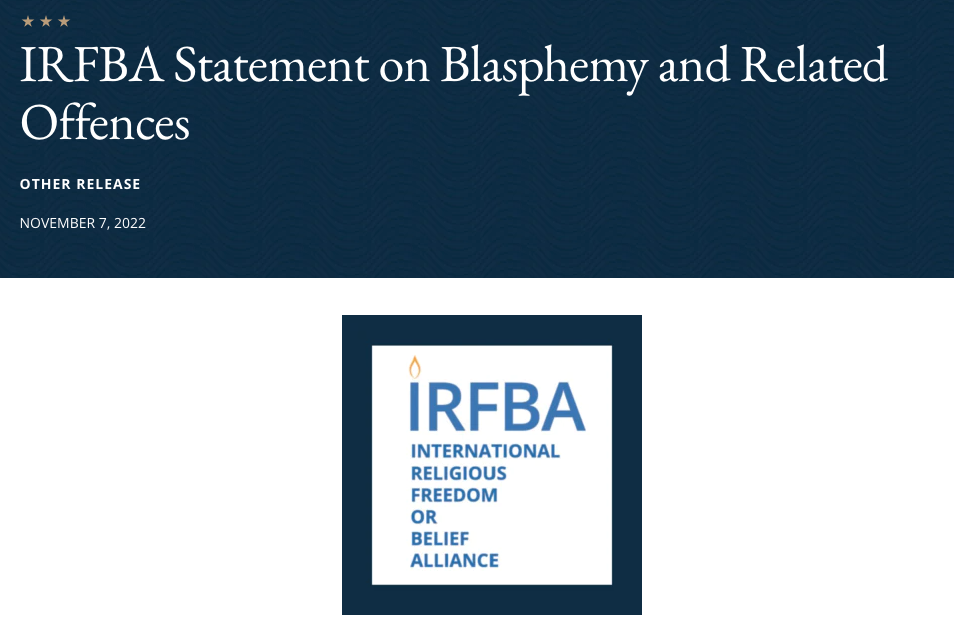7 November 2022 | Washington DC: Members of the International Religious Freedom of Belief Alliance (IRFBA) release statement calling for the “unequivocal[] repeal of the death penalty for any activity categorised as blasphemy, apostasy, or speech that might ‘defame’ or ‘insult’ religious sentiments” on the voting-week of two key United Nations General Assembly Resolutions – the Moratorium on the Death Penalty and Extrajudicial and Summary Executions.
Unfortunately, at least 12 states continue to maintain the death penalty for apostasy and blasphemy while the general trend towards a moratorium on the death penalty increases. These states include: Afghanistan, the Islamic Republic of Iran, Brunei, the Maldives, Mauritania, Nigeria, Pakistan, Qatar, Saudi Arabia, Somalia, United Arab Emirates, and Yemen.
The statement comes as the Islamic Republic of Iran – one of the at least 12 states with the death penalty for apostasy and blasphemy – is currently conducting large scale arrests and summary executions of protesters, “sometimes within less than two hours,” Hamid Gharagozloo with International Organisation to Preserve Human Rights, shares. In Afghanistan, the Taliban, infamous for its opposition to freedom of religion and belief and the right to life, [the Taliban regime rule from 1996 until 2001 included numerous public executions, amputations, and floggings at sports stadiums in Afghanistan], risks bringing the shadow courts to the public space which includes the death penalty for apostasy. There are already documented reports of extrajudicial executions of religious minorities, such as the Taliban executions of Hazaras in June 2022. The death penalty for apostasy, which existed in Afghanistan before the second arrival of the Taliban, was used by a prosecutor to sentence a Christian convert to death for apostasy in 2006. The court in the end however ultimately ruled there were, “investigative gaps” in the case and released the man who had to flee the country. The risk of summary executions now, however, is even higher. Pakistan, another of the countries with the death penalty for blasphemy, is among the four countries [Bangladesh, Nigeria and Egypt] which account for 80% of the incidents of mob activity, violence, or threats (with or without state enforcement), and currently detains 16 individuals on death row for blasphemy.
The statement cements the IRFBA members’ commitment to freedom of religion or belief and expression, noting how apostasy and blasphemy laws oppose these fundamental rights, as expressed in their earlier joint statements from the 2018 and 2019 Ministerial conferences to advance freedom of religion or belief. In March 2021, over 50 states released a joint statement during the Human Rights Council session calling for the repeal of the death penalty for apostasy and blasphemy. The statement, led by Australia, was followed by the release of a groundbreaking report by Monash University Killing in the Name of God: State-Sanctioned Violations of Religious Freedom , which reviewed the at least 12 countries which maintain the death penalty for apostasy and blasphemy.
” […] blasphemy laws impede the freedoms of expression and religion or belief in ways inconsistent with the Universal Declaration of Human Rights and the International Covenant on Civil and Political Rights.”
– IRFBA Statement on Blasphemy and Related Offences, 7 November 2022.
The statement also urges governments to impose moratoriums on executions for blasphemy or related offences, and unconditionally release individuals “imprisoned based on their views on matters of religion or belief that may differ from official narratives or the views of majority populations.” This is the first IRFBA statement in support of a UNGA resolution not explicitly focusing on freedom of religion or belief. The preamble of the statement notes the “interconnected nature of freedom of religion or belief with other human rights”, and how blasphemy laws “impede the freedoms of expression and religion or belief in ways inconsistent with the Universal Declaration of Human Rights and the International Covenant on Civil and Political Rights.”
In September 2022 a coalition of advocates headed to the UNGA to urge member states to support the 90+ strong global coalition of individuals and civil society organizations in support of two Charters calling for the embedding of language in the two UNGA resolutions calling on the repeal of the death penalty for apostasy and blasphemy. The vote for the new language in the resolutions will be voted on by the end of this week.

